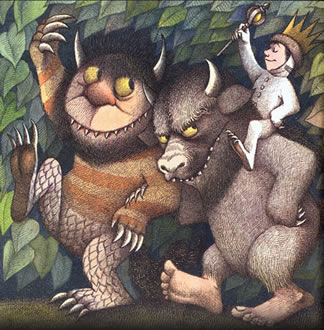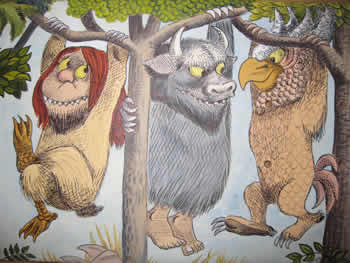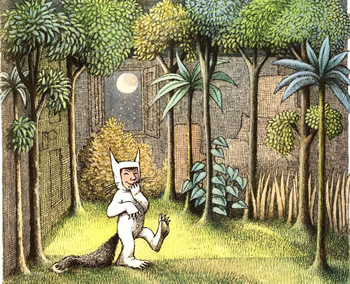Befriending our Brokenness:
Lessons from Maurice Sendak (1928–2012)
For Sunday July 29, 2012
Lectionary Readings (Revised Common Lectionary, Year B)
2 Samuel 11:1–15 or 2 Kings 4:42–44
Psalm 14 or Psalm 145:10–18
Ephesians 3:14–21
John 6:1–21
One of the many gifts that my wife gave our children was reading aloud to them. A favorite family book was Where The Wild Things Are (1963) by Maurice Sendak, who died in May from complications of a stroke. It's a story about a mischievous boy named Max who wears a wolf suit. His mother scolds him as a "Wild Thing," to which Max responds, "I"ll eat you up!" Sent to his room without supper, Max dreams of grotesque monsters who "roared their terrible roars and gnashed their terrible teeth and rolled their terrible eyes and showed their terrible claws." Max conquers the beasts by "staring into all their yellow eyes without blinking once."
 |
Where The Wild Things Are has sold twenty million copies and catapulted Sendak to international fame, notwithstanding its controversial content and curmudgeonly author. Sendak was born into a family of Polish Jewish immigrants in lower class Brooklyn. A sickly child, he spent hours drawing in bed. He experienced the Depression and World War II as a youngster. He once described the Holocaust as a "terrible situation" that haunted his family with its shadow of death. Growing up gay in that time and place was terribly difficult: “All I wanted was to be straight so my parents could be happy,” he told The New York Times in a 2008 interview. Despite living with his partner Dr. Eugene Glynn for fifty years, Sendak said, “They never, never, never knew.”
Sendak understood the tragic character of life and the dark nature of the human psyche. In a 2009 interview he said, "I have serious flaws. And I think they come from a time of one's life when one is very young and they stick to you like glue. And then things change when you get older. You're doing what you want to do. You're very lucky. Oh, the books, the books, the books; the prizes, the prizes, the prizes, the prizes. [But] it doesn't matter that you've done a hundred books. It doesn't mean anything when people say, 'I read your book. I like it so much.' People do say awfully nice things, but it doesn't change the fact that you're a stinky person by nature."1
This sense of personal brokenness overshadowed Sendak's enjoyment of professional success. And so instead of safe and sanitized children's books, Sendak plunged young readers into a scary and vulnerable world.
King David might have been "a man after God's own heart," but he had his dark side. Given that most ancient peoples divinized their kings and sanitized their faults, it's fascinating how the Old Testament reading this week paints an unflattering portrait of the royal family. The parallel version of this story in 1 Chronicles 20 even omits David's adultery. The story is about uncontrolled human desire for Bathsheba. About a powerful king exploiting the vulnerable Uriah and then killing him. Instead of leading his troops into battle, David "remained in Jerusalem" for an adulterous liaison. And his personal failure brought tragic consequences: "Thus says the Lord, 'I will raise up trouble against you from within your own house; and I will take your wives before your own eyes, and give them to your neighbor, and he shall lie with your wives in the sight of this very sun" (12:11).
 |
But David was no exception. Nor are we today. Many of the major characters in the story of redemption are presented as deeply flawed people. Abraham was a liar. Jacob defrauded his father and brother. Moses was a murderer who resisted God's call. Jonah complained about God's mercy to the pagan Ninevites. Peter denied that he would deny Jesus, but then did so three times. All the disciples did the same thing. Paul lamented that he was the least of all the apostles for his persecution of the church.
In his powerful autobiography The Seven Storey Mountain, the Trappist monk Thomas Merton (1915–1968) contrasts two ways of living Christianly. The exterior or external self, he said, is a life of self-impersonation, superficiality, alienation, conformity, indulgence, and narcissism: “Reflect, sometimes, on the disquieting fact that most of your statements of opinions, tastes, deeds, desires, hopes and fears are statements about someone who is not really present. When you say ‘I think,’ it is often not you who think, but they — it is the anonymous authority of the collectivity speaking through your mask. When you say ‘I want,’ you are sometimes simply making an automatic gesture of accepting, paying for, what has been forced upon you. That is to say, you reach out for what you have been made to want.”
"The basic and most fundamental problem of the spiritual life," said Merton, "is this acceptance of our hidden and dark self."
Given the insecurities provoked by our admission of failures and the punishment for them by others, it's tempting to deny, rationalize, or attempt a personal makeover. This is natural and understandable, but it gets us nowhere. We all long to be loved and accepted for just who we are and where we are, and that is precisely what God offers us. But as Frederick Buechner writes, "that is often just what we also fear more than anything else… Little by little we come to accept instead the highly edited version which we put forth in hope that the world will find it more acceptable than the real thing." David's famous confession in Psalm 51 reminds us that candor and contrition are our best friends.
 |
The story of David and Bathsheba shows how God uses even our worst sins in redemptive ways. Our best Christian guides have always observed how God brings good out of evil. St. Augustine wrote, “God judged it better to bring good out of evil than to allow no evil to exist.” The contemporary Frederick Buechner writes, “sin itself can be a means of grace.” Julian of Norwich (1342–1414) once said that “sin will be no shame but an honor.” Anthony deMello writes that “repentance reaches fullness when you are brought to gratitude for your sins.” Finally, Thomas Aquinas (1224–1274) gave us the startling phrase "O felix culpa!" in reference to the fall of Adam. “O fortunate crime!” The fall of Adam with all its catastrophic consequences triggered something far better and greater — the incarnation, life, death and resurrection of Jesus.
About the same time that Maurice Sendak died in May, I read Richard Rohr's new book "Falling Upward" (2011). It's what you might call a spirituality of imperfection or successful failure. "The genius of the biblical revelation," he insists, "is that it refuses to deny the dark side of things, but forgives failure and integrates falling to achieve its only promised wholeness."
For further reflection: "Should we fall, we should not despair and so estrange ourselves from the Lord’s love," encouraged St. Peter of Damaskos (12th century); "let us always be ready to make a new start. If you fall, rise up. If you fall again, rise up again."
[1] "Wild Things," The New Yorker (May 21, 2012), p. 58.Image credits: (1) TVTropes.org; (2) AcrylikStudio.com; and (3) PhillipKay.wordpress.com.





